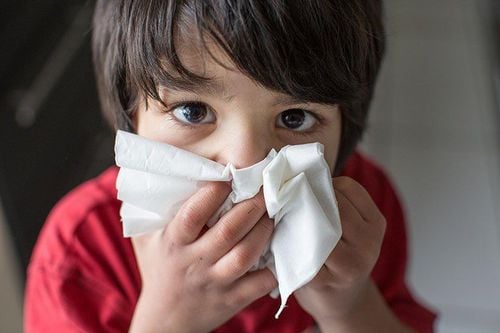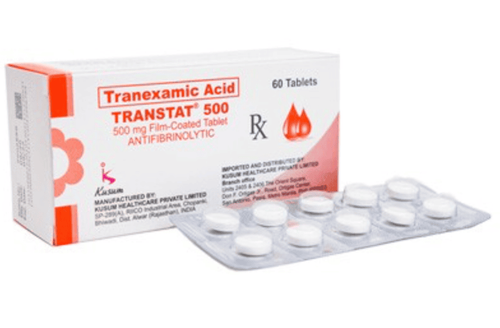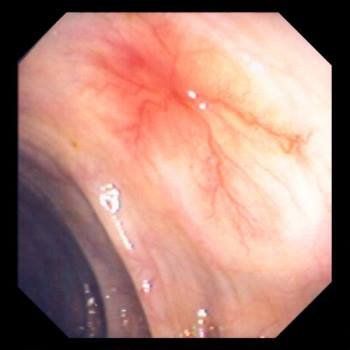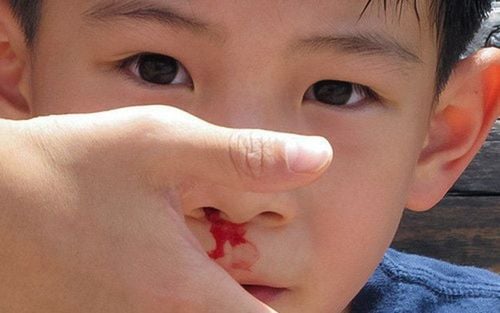This is an automatically translated article.
Nosebleeds are a fairly common condition in children. Although this is not an uncommon phenomenon, it causes many parents to feel anxious and confused. You can resolve a nosebleed by tilting your child's head forward and plugging his or her nose. To prevent frequent nosebleeds, keep the air from getting too dry and don't let your child put his finger (or anything else) in his nose.
1. What is a nosebleed?
Nosebleeds are sudden red blood flows from the nasal cavity.
In general, nosebleeds do not have a major impact on health, but children can feel panic, bewildered. In the case of a child with prolonged bleeding, the more dangerous effect is to make the child lose a lot of blood, and increase the risk of nasopharyngeal fibroids.
Moreover, if children have frequent nosebleeds, they often develop slower than children of the same age. Because the amount of blood flowing out makes an imbalance with the amount of nutrients provided to the body. The consequences of this phenomenon are dizziness, poor appetite, anemia, and possibly malnutrition.

Thường xuyên chảy máu cam có thể gây thiếu máu ở trẻ
2. How to prevent nosebleeds in children?
If your child has a nosebleed, you need to take the following steps:
Be calm and comfort the child. Place your baby on your lap and tilt his head slightly forward. Using a clean, soft tissue or tissue, gently cover the child's nose. Press gently, continuously for 5 minutes. During this time, you can distract your child by singing to him, reading a book or watching a video (depending on his age). If your child is old enough, you can let him cover his or her own nose. After five minutes, release your hand and see if the bleeding has stopped. If not, cover the child with a hat for ten minutes. (If the child feels uncomfortable when you plug the nostril tightly, you can try plugging the bleeding nose, if the bleeding is only on one side.) If the above steps do not help, As a result, try applying cold compresses to the bridge of your nose for 5 to 10 minutes. Note:
Do not tilt the child's head back or let the child lie down. This will cause blood to flow down the child's throat; lead to vomiting in children. Do not cover your child's nose with cotton or gauze during or after a nosebleed. Bleeding may start again as soon as you remove the cotton and may break up any clots that have formed.
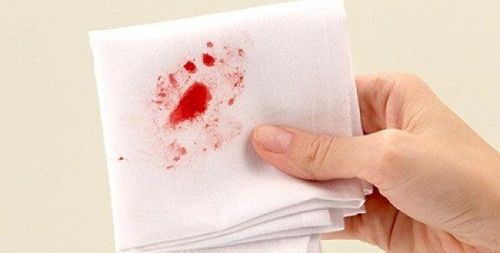
Hãy thấm máu cam cho trẻ bằng giấy sạch
3. When should I call the doctor?
Contact a doctor immediately if the measures above do not work:
Child becomes weak or dizzy Pale, sweaty, weak or dizzy Child loses a lot of blood (nosebleeds often look worse, but if you're concerned, talk to your child's doctor) Bleeding from the mouth Has vomiting blood or a brown substance that looks like coffee grounds Bleeding after a blow to the head or a fall The child may have stuffed something it in my nose.
4. What to do if you can't stop a nosebleed?
The doctor will look at the baby's nose with a special light to determine where the bleeding is coming from. In addition, the doctor will take some of the following measures:
Place silver nitrate on the bleeding site Use nasal drops to constrict blood vessels Place cotton swabs in the child's nose Cover the child's nose with gauze if bleeding heavily If your child has had a blow to the head or nose, the doctor will conduct further examination and monitor the wound as the swelling subsides. Do this to make sure that the child does not have a broken nose or skull fracture.
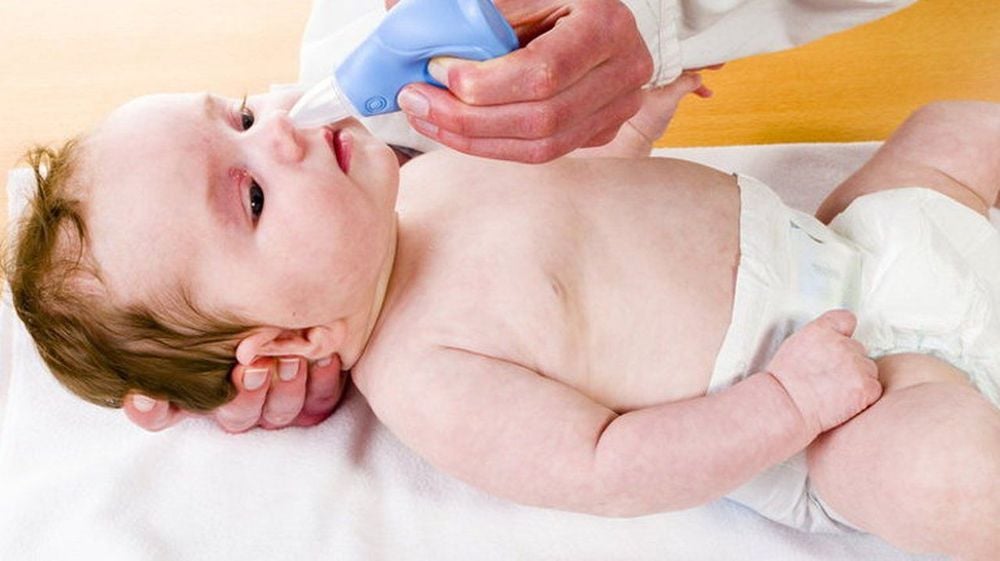
Ba mẹ có thể dùng thuốc nhỏ mũi để hạn chế tình trạng chảy máu cam ở trẻ
5. What causes nosebleeds?
The nose has many small blood vessels that bleed easily - especially when they are dry or irritated. Most nosebleeds in children are anterior nosebleeds, which means that the small blood vessels (capillaries) in the front of the nose have broken. (Posterior nosebleeds occur deeper inside the nose - eg due to trauma.),
Common causes of nosebleeds include:
Colds, allergies and sinus infections Humidity low or very cold air Trauma (such as picking your nose, foreign object in your nose, blowing your nose too hard or being bumped into your nose) Some less common reasons, nosebleeds can be caused by:
A problem solving surgery (such as structural abnormalities or growths in the nose) Abnormal blood clotting. This can be caused by certain blood diseases (such as hemophilia) and certain medications. Exposure to toxic fumes Chronic illness.

Trẻ cảm lạnh rất dễ bị chảy máu cam
6. Is frequent nosebleeds a cause for concern?
Usually frequent nosebleeds are not a cause for concern. Children often have nosebleeds, especially in the winter months, when the air is dry and infections are easy. You may even notice dry blood on your child's bed in the morning if he has nosebleeds overnight. Most cases of nosebleeds in children are no cause for concern.
Immediately notify the doctor about your child's chronic nosebleeds if the child:
Has just taken medicine and has started to have a lot of nosebleeds. Frequent nosebleeds and a stuffy nose Easy nosebleeds and bruising Bleeding from other areas, such as the gums Frequent nosebleeds that last longer than 8 to 10 minutes Your doctor may order tests blood (to check for clotting problems) and refer you to a pediatric otolaryngologist for testing.

Trẻ thường xuyên chảy máu cam kèm theo các dấu hiệu khác cần được đưa đến bệnh viện
7. Preventing nosebleeds in children
If the indoor air is dry, use a humidifier in the child's room at night.
Do not let the child put anything in the nose. If your child has a habit of putting his fingers in his nose, trim his fingernails so that he is less likely to injure the lining of his nose. Talk to your doctor about treating allergies if you think they may be contributing to a problem. Ask your doctor about using saline nasal drops daily to keep your child's nose moist. If your child participates in sports, make sure he or she wears appropriate protective equipment to prevent nose injuries. Keep your child away from secondhand smoke If your child has frequent nosebleeds, use a cotton swab to gently apply mineral oil (or non-kerosene wax) to the inside of his or her nose twice a day. Pay attention to cover the septum (the part separating the two nostrils) and not go too deep into the nose; The bottom half is enough. This can be especially helpful when the air is dry (for example, in winter or when traveling in high altitude areas) or other times when a child is prone to nosebleeds (for example, during flu season). application). When a child has abnormal signs of health, parents can take the child to Vinmec Health system for timely examination and treatment.
As a key area of Vinmec Health System, Pediatrics Department - Vinmec International General Hospital always brings satisfaction to customers and is highly appreciated by industry experts thanks to the following advantages:
Gathering a team of leading doctors and doctors in Pediatrics: Including leading experts, highly qualified (professors, associate professors, doctorates, masters), experienced, worked in hospitals big hospitals like Bach Mai, 108.. The doctors are all well-trained, professional, have a heart - reach, understand young psychology. In addition to domestic pediatric specialists, the Department of Pediatrics also has the participation of foreign experts (Japan, Singapore, Australia, USA) who are always pioneers in applying the latest and most effective treatment regimens. . Comprehensive services: In the field of Pediatrics, Vinmec provides a series of continuous medical examination and treatment services from Newborn to Pediatric and Vaccine,... according to international standards to help parents take care of their baby's health from birth to childhood. from birth to adulthood Specialized techniques: Vinmec has successfully deployed many specialized techniques to make the treatment of difficult diseases in Pediatrics more effective: neurosurgery - skull surgery, stem cell transplantation. blood in cancer treatment. Professional care: In addition to understanding children's psychology, Vinmec also pays special attention to the children's play space, helping them to have fun and get used to the hospital's environment, cooperate in treatment, improve the efficiency of medical treatment.
Please dial HOTLINE for more information or register for an appointment HERE. Download MyVinmec app to make appointments faster and to manage your bookings easily.
Reference source: Babycenter.com




